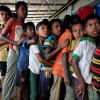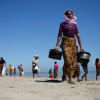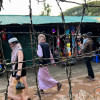Rohingya Influx: Needs of affected locals 'ignored'
While locals in Cox's Bazar are bearing the brunt of socio-economic and environmental damages due to the massive influx of Rohingyas, their needs are being largely overlooked, said local government representatives and officials of the district yesterday.
Many of the host people in Ukhia and Teknaf, who provided shelter and food to the Rohingyas in the early weeks of the crisis, are now largely worried -- a situation that is triggering tension between locals and refugees, they said.
It is crucial that the aid agencies immediately take initiatives to provide livelihood options for the locals and promote social cohesion, they said at a discussion on “Joint Response Planning (JRP) for Rohingya Humanitarian Crisis and affected Host Communities.”
Cox's Bazar Civil Society and NGO Forum (CCNF) and the Inter-Sector Coordination Group (ISCG), a coordinating body of the aid agencies responding to the Rohingya crisis, organised the event at a hotel in Cox's Bazar yesterday.
Representatives of international aid agencies, local government representatives, officials and national NGOs were present at the discussion.
The day labourers in Cox's Bazar have lost their jobs because of oversupply of labour from the refugees, said Refugee Relief and Repatriation Commissioner (RRRC) Abul Kalam.
He said local people who depend on hills and forest for livelihood have also lost their livelihood options as the Rohingyas are clearing forests for fuel and cutting hills to build shelters, he said at the discussion.
“The tension between the locals and refugees is mounting. If it increases, the situation may worsen in the future,” Abul Kalam said.
According to ISCG, Rohingya influx has led to increased pressures on firewood and transport services, water, basic services, environment and competition for jobs.
In Cox's Bazar, on an average 33 percent people live below poverty line and 17 percent below extreme poverty line, said Rhonda Gossen of ICSG.
“The current situation risks slowing -- and even reversing -- efforts towards achievement of sustainable development goals in Cox's Bazar,” she said.
Cox's Bazar Civil Surgeon Dr Abdus Salam said the existing health facilities are seeing three-fold patients every day.
“Logistics and human resources are limited. Some of you [aid agencies] are helping us, but these things are overlapping. You should sit with and ask me what we need. Then you decide how you improve the hospital,” he said.
Tahera Akhter Mili, vice-chairwoman of Teknaf Upazila Parishad, said NGOs claim that they have plans to provide assistance to local people, but they have yet to implement those.
Often there are disputes between the Rohingyas and the locals over competition in day labour and thus law and order in and around the refugee camps is deteriorating, she said and suggested that local youths should be trained and provided jobs.
Marzina Akhter, a woman UP member from Teknaf, said with the rise in population, the local women cannot get out of home in the evening as they face eve teasing.
Mozaffar Ahmed, UP chairman of Palongkhali in Ukhia, said public representatives need to be involved in projects undertaken by the aid agencies.
FUND FOR LOCALS
The United Nations and the government have prepared a plan to provide an assistance of $950 million to the Rohingya refugees and the vulnerable locals in Cox's Bazar for 10 months until December.
The plan incorporates 25 percent of the money for the affected local community, said Sumbul Rizvi, senior coordinator at the ISCG.
However, so far the response from the international community has been poor and only 16 percent of the money confirmed.
Sangjukta Sahani of UN Migration Agency said a good number of NGOs are working for the host community, but more needs to be done to support them, he added.
CCNF Co-chair Rezaul Karim Chowdhury said as there is fund shortage, it is critical to devise ways to reduce operational cost and improve efficiency.
There are many expatriates engaged in operations in Cox's Bazar, which is very costly. It is time now that local NGOs are involved in the whole operations, he said.

 For all latest news, follow The Daily Star's Google News channel.
For all latest news, follow The Daily Star's Google News channel. 








Comments